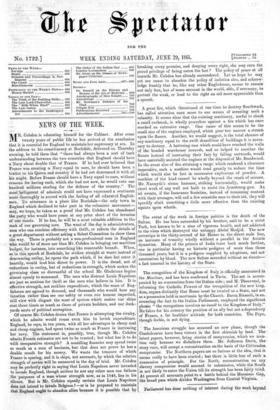A great fire, which threatened at one time to destroy
Southwark, has called attention once more to our means of arresting such a calamity. It seems clear that the existing machinery, useful to check a small outbreak, is wholly powerless against a fire which has once reached an extensive range. One cause of this seems to be the small size of the engines employed, which pour too narrow a strewth upon the flames. Another, we would suggest, is the total absence of any machinery equal to the swift demolition of buildings it is neces- sary to destroy. A battering ram which could have crushed the walls of the bonded warehouse inwards, and so helped to smother the flames instead of increasing 'their fury by falling outwards, would have materially assisted the engines at the disposal of Mr. Braidwood. In the event also of fire attaining a range which rendered a clearance imperative, such a machine would tend greatly -to reduce the time which would else be lost in successive explosions of powder. A machine of the kind cannot be wholly beyond the reach of science. Mr. Nasmyth's steam hammer, striking horizontally, would make short work of any wall not built to resist the Armstrong gun. At all events, if the Insurance Societies,. instead of remaining content with their averages, will call a few scientific men to their aid, they will speedily elicit something a little more effective than the existing squirts upon wheels.






























